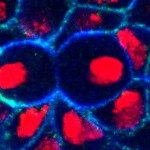Lien vers Pubmed [PMID] – 36323649
Lien vers HAL – hal-04235184
Lien DOI – 10.1080/19336934.2022.2142460
Fly, 2022, 16 (1), pp.360-366. ⟨10.1080/19336934.2022.2142460⟩
Multiscale analysis of morphogenesis requires to follow and measure in real-time the in vivo behaviour of large numbers of individual cells over long period of time. Despite recent progress, the large-scale automated tracking of cells in developing embryos and tissues remains a challenge. Here we describe a genetic tool for the random and sparse labelling of individual cells in developing Drosophila tissues. This tool is based on the conditional expression of a nuclear HaloTag protein that can be fluorescently labelled upon the irreversible binding of a cell permeable synthetic ligand. While the slow maturation of genetically encoded fluorescent renders the tracking of individual cells difficult in rapidly dividing tissues, nuclear HaloTag proteins allowed for rapid labelling of individual cells in cultured imaginal discs. To study cell shape changes, we also produced an HaloTag version of the actin-bound protein LifeAct. Since sparse labelling facilitates cell tracking, nuclear HaloTag reporters will be useful for the single-cell analysis of fate dynamics in Drosophila tissues cultured ex vivo.




